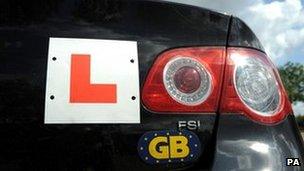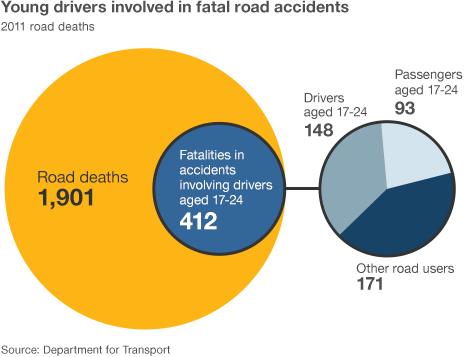Driving test age rise considered for teenagers
- Published

Learners can currently take a driving test aged 17
Teenagers could have to wait a year longer than currently before they are allowed to take their driving test.
The government is considering issuing only 12-month probationary licences at the age of 18 in a bid to cut accidents involving young motorists.
New drivers would also face a curfew between 22:00 and 05:00 unless a passenger aged over 30 was in the car.
Ministers are due to publish a Green Paper this year after considering the Transport Research Laboratory's report, external.
It recommends a one-year "learner stage" beginning at 17, during which drivers would have to total at least 100 hours of daytime and 20 hours of night-time practice under supervision.
Learners can then take their test at 18 and, if they pass, will get a probationary licence and have to display a green "P" plate.
During this stage, drivers will face the curfew and all those under 30 will be banned from carrying any passengers also under 30.
Other proposals under consideration for young drivers are a ban on all mobile phone use, including hands-free phones, and a lower alcohol limit.
After the 12-month probationary period, drivers will automatically graduate to a full licence and unrestricted driving.
Statistics show that more than a fifth of deaths on British roads in 2011 involved drivers aged 17-24.
The report suggests implementing this new system could cut annual casualty numbers by 4,471 and save £224m.
A Department for Transport spokesman said: "Young drivers drive around 5% of all the miles driven in Britain but are involved in about 20% of the crashes where someone is killed or seriously injured.
"We are committed to improving safety for young drivers and reducing their insurance costs - that is why we are publishing a Green Paper later in the year setting out our proposals.
"This will include a discussion about how people learn to drive.
"The research report has been produced by the Transport Research Laboratory under commission by the Department for Transport and it, amongst other things, has informed the Green Paper."
Proposals welcomed
Stephen Glaister, director of the RAC Foundation motoring research charity, welcomed the proposals.
He said: "Young people are four times more likely to die in a road accident than as a result of drink or drugs.
"Yet, as a society we seem to turn a blind eye to the carnage. If this was any other area of public health there would be an outcry.
"This is about ensuring their long-term safety and mobility. Not curtailing it."

Edmund King, president of motoring organisation the AA, said the proposals were addressing the problem of young drivers in the "wrong way".
"You should prepare young drivers to be safe when they get their licence rather than give them their licence and then restrict them," he told BBC's Breakfast.
He said he would like to see mandatory lessons on motorways, in rural areas and in bad weather, and warned of the problems of policing the restrictions such as carrying young passengers.
Julie Townsend, of road safety charity Brake, welcomed the report, saying it was further recognition of the compelling case for graduated driver licensing.
She urged the government to act "swiftly and decisively" to commit to the system to help reduce the danger young drivers posed to themselves and others.
Currently drivers in England, Scotland and Wales need to pass a theory test, then a practical test before they can apply for a full driving licence. The minimum age to hold a full car licence is 17, or 16 for some people claiming mobility benefit.
Your comments
My son is 12-years-old and has had five lessons with a young drivers school. Why doesn't the government promote these in school? They give kids the chance to learn at a early age to drive sensibly. These school are run throughout the country but even after taking lessons they don't get any credit from insurance companies. Let's look at this instead of increasing the age of driving. Rod Peart, Carlisle, Cumbria
I think it is great to raise the age, set out curfews and limit the amount of hours that these kids need to practice before taking their test. My son is now 18-years-old, but he had a lot of practice on the road and passed second time round. He seems very aware of the dangers. But not all his peers are the same - at least three of them have had accidents during their first few weeks of driving - at least two of those accidents were because they were showing off to each other. Go on - raise the age and add some curfews. Gael Atkinson, Sussex
I am 17-years-of-age and have been learning for the past four months and I am almost ready to take my test. Whilst on my driving lessons my instructor and I see countless people over the age of 30 driving dangerously. Age is not the problem, maturity is. My family have been in few collisions where people over the age of fifty haven't looked or couldn't control their car. Where are the limitations for them?Reanne, Exeter, Devon
My 19-year-old son has recently passed his test and my 17-year-old will be wanting lessons at some point. We live in a rural area where there is little public transport. This suggestion would mean that my 17-year-old son would not be able to take up a night shift job to support himself or drive to school. Rather than fiddle about with difficult to enforce curfews, etc. for young drivers, would it not be better to have a more rigorous driving test, involving motorways, rural roads and night driving?John Hall, Steeple Bumpstead, Essex
As a driving instructor I welcome these proposals. We need to get people talking about how we can improve the skills of new drivers. The statistics for accidents involving young drivers are horrific. The probationary licence for new drivers sounds like a good idea in theory although we kind of have that at the moment, as if you accrue six points in your first year of driving you will have to resit your test. I myself would be in favour of a longer test with all the manoeuvres and motorway driving looked at. Steve Kirk, Bolton, Greater Manchester
It should be raised to the age of 21. This would reduce accidents, free up roads, increase use of public transport, make young people walk or cycle thereby promoting health and energy, ensure that some maturity and responsibility in life was achieved prior to driving, and would reduce insurance costs for all. I have three sons, all aged over 23, only one drives having passed his test at the age of 22. Gary Stapleton Harrogate, North Yorkshire
By the time teenagers learn to drive they are expected to take contract buses into college, or get public transport to work or apprenticeships. The price of these go up way higher than the rate of inflation and it's clearly forcing everyone onto the road. It's not just teenagers who are being involved in accidents! A lot of colleagues at school will have to take more money from their parents to be able to pay for transport. They will be even more dependent on their parents. I, myself, haven't learned to drive yet, I am 18 and am starting driving lessons soon. I just think that these sort of measures are driving the country into some Orwellian Police State.Miles, Fareham
- Published10 October 2013
- Published27 September 2013
- Published17 July 2013
- Published30 April 2013